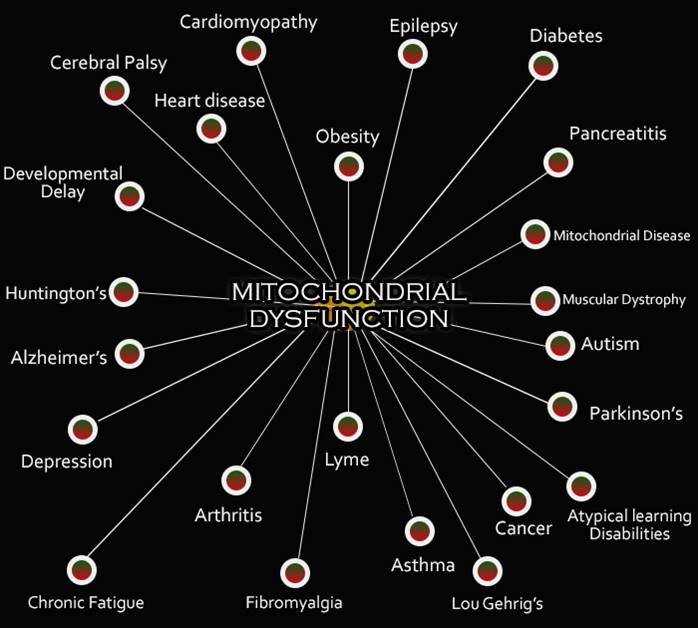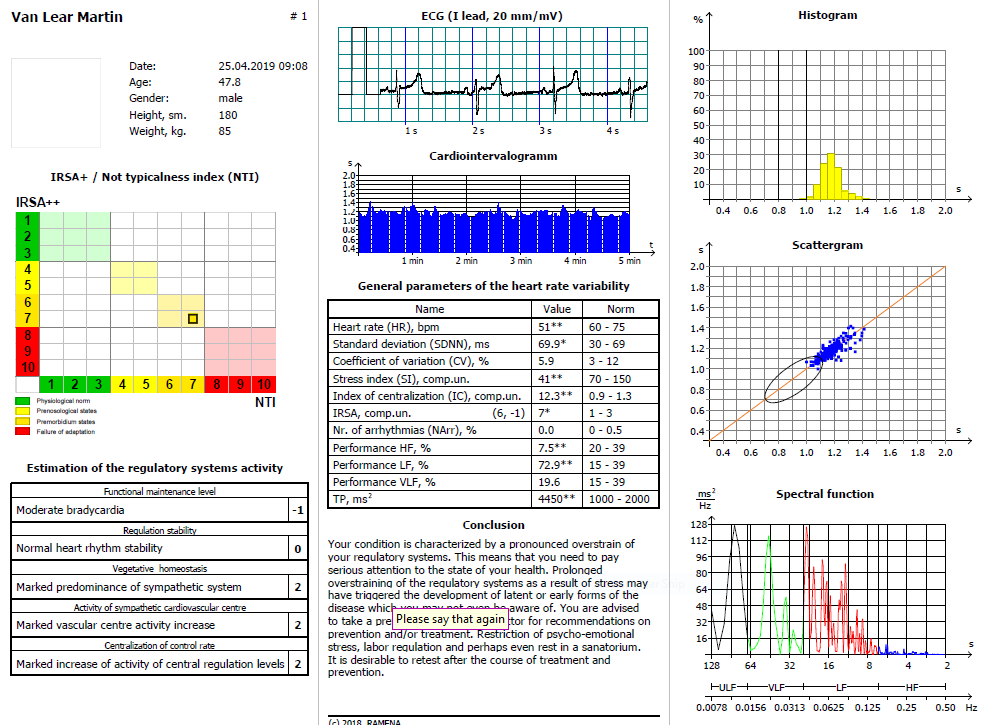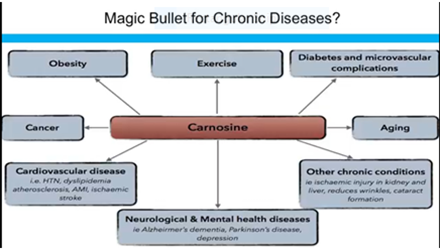What Are Mitochondria?
Mitochondria are often referred to as the cell’s powerhouses because they play a central role in energy production, generating molecules called Adenosine triphosphate (ATP) that fuel all cellular activities. Consequently, they are considered our primary source of energy.
There are approximately 250 mitochondria in each cell, amounting to a staggering 250 quadrillion in total. This astounding number accounts for about 20% of our body weight. To put it into perspective, a 170-pound individual can produce up to 170 pounds of ATP on an average day to sustain their mitochondria.
However, the efficiency of our mitochondria tends to decline with age, beginning around the age of 26, as a natural part of the aging process. Unfortunately, when these mitochondria become damaged due to factors such as toxins, stress, or infections over time, they become less efficient and may lose their ability to repair themselves. This can lead to a decrease in energy production for cellular repair and result in decreased cellular efficiency, toxin buildup, oxygenation issues, and eventually organ dysfunction. Commonly affected organs include the thyroid and adrenal glands, as they try to compensate for the lack of cellular repair.
Mitochondrial dysfunction has been identified as the root cause of many chronic diseases.

Mitochondrial Damage
Some stressors that can cause mitochondrial damage include everyday stress, diet, aging, nutrient deficiencies, lifestyle factors like smoking and alcohol abuse, genetic variations (SNPs), exposure to toxins like Glyphosate and Heavy Metals, chronic infections such as Lyme disease, biotoxin exposure like mold toxins, electromagnetic stress from cell phones and Wi-Fi, emotional issues such as anxiety and depression, hypercoagulability, and more.
Symptoms of mitochondrial dysfunction may include brain fog, lack of focus, headaches, joint and body pain, hormonal imbalances, sleep disturbances, anxiety, depression, blood sugar irregularities like diabetes, elevated heart rate and blood pressure, exercise intolerance, and chronic fatigue.
Supporting Mitochondria:
To address mitochondrial health, it’s crucial to address various stressors in our lives that can impact mitochondrial function. This can be achieved through the following interventions:
-
Utilizing stress management techniques.
-
Identifying and eliminating stressors when possible, such as addressing job or relationship-related stress.
-
Modifying lifestyle factors, like reducing alcohol consumption and quitting smoking.
-
Addressing underlying toxicities, including heavy metals, through comprehensive detox programs like coffee enemas, sauna therapy, and lymphatic drainage.
-
Treating underlying infections, such as Lyme disease and co-infections.
-
Avoiding exposure to mold and other biotoxins.
-
Addressing nutrient deficiencies.
-
Avoiding problem foods and allergens.
-
Addressing hormonal imbalances.
-
Managing chronic pain or structural issues.
-
Transitioning from unnecessary pharmaceutical medications to more natural therapies.
-
Ensuring adequate sunlight exposure.
-
Engaging in daily exercise, particularly forms like High-Intensity Training (HIT) can boost mitochondrial density.
Assessing Mitochondrial Health:
There are no standard lab tests that can directly assess mitochondrial function. However, some indirect measures, such as evaluating various nutrients essential for mitochondrial function or using the Organics Acids Test (OAT) to assess metabolites related to ATP production, can provide insights. Additionally, the ion panel by Genova Diagnostics offers a comprehensive evaluation of mitochondria.
Another approach is assessing heart rate variability (HRV), which can gauge the body’s ability to adapt to stress and overall mitochondrial function. Advanced HRV systems can measure various aspects of health, including hormonal, cardiovascular, and immune function, and offer an indirect measure of mitochondrial capacity. This data helps tailor mitochondrial support to individual needs, aiming to achieve a state of effective stress adaptation.

Heart Rate Variability can assess the success of a supplementation or treatment program in a unique way.
Nutritional Support for Mitochondria:
Certain key nutrients have demonstrated support for mitochondrial function, including coenzyme Q10, l-carnitine, and l-carnosine. Coenzyme Q10 is crucial in the mitochondrial respiratory chain and acts as an antioxidant. L-carnitine plays a role in fatty acid oxidation and energy metabolism.
L-carnosine, in particular, offers various benefits such as modulating chronic low-grade inflammation, reducing oxidative stress, lowering advanced glycation end products, addressing ischemia (low oxygen levels), decreasing sympathetic nervous system activity, and more.
Other supportive nutrients include PPQ (Pyrroloquinoline Quinone), magnesium, NAD, zinc, various B-vitamins, and D-Ribose.
Incorporating these nutritional supports can be instrumental in enhancing mitochondrial function and overall health.

Mitochondrial Support Program:
A specialized mitochondrial program developed by Dr. Michael Kucera, MD, focuses on empowering mitochondria to adapt, repair, and recover from chronic illness. It combines various advanced mitochondrial supports to address individual needs. Timing is crucial, as these supports should be introduced when the body can effectively utilize them, often after the root cause of mitochondrial dysfunction has been addressed.
Overall Benefits of Mitochondrial Support:
Mitochondrial support offers numerous advantages, including reduced stress, improved sleep, increased energy, pain and inflammation reduction, enhanced brain function (such as concentration and memory), strengthened immunity, potential weight loss after a few months, enhanced athletic performance, improved libido, detoxification, cardiac function improvement, reduced reliance on medications and supplements (though close monitoring is essential for certain medications), better eye health, anti-anxiety and anti-depressant effects, anti-aging properties (potentially reducing biological age by up to 15 years after 1-2 years of use), anti-cancer effects, and benefits across a wide range of diseases.
For more information on mitochondrial support, please contact our office.
References:
-
For more in-depth information on mitochondria, please see this video.
-
Translating the basic knowledge of mitochondrial functions to metabolic therapy: Role of L-carnitine: https://www.ncbi.nlm.nih.gov/pmc/articles/PMC3590819/
-
Aging, Proteotoxicity, Mitochondria, Glycation, NAD+ and Carnosine: Possible Inter-Relationships and Resolution of the Oxygen Paradox https://www.ncbi.nlm.nih.gov/pmc/articles/PMC2874395/
-
Coenzyme Q and Mitochondrial Disease https://www.ncbi.nlm.nih.gov/pmc/articles/PMC3097389/
-
Pyrroloquinoline Quinone Stimulates Mitochondrial Biogenesis through cAMP Response Element-binding Protein Phosphorylation and Increased PGC-1α Expression* https://www.ncbi.nlm.nih.gov/pmc/articles/PMC2804159/
-
Dr. Barbara de Courten, Carnosine Research,https://www.touchendocrinology.com/media_gallery/barbora-de-courten-ada-2018-carnosine-supplementation-in-diabetes-prevention/



